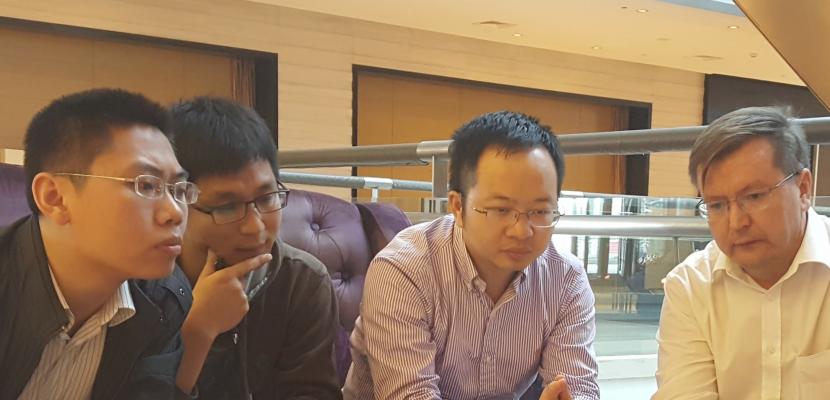Image

Rural SME internationalisation model
Published on 30 June 2020

Finland
This is the good practice's implementation level. It can be national, regional or local.
About this good practice
Small rural companies may have excellent products and strong know-how in their own specialty field, but limited contacts to international markets and low know-how in reaching them. Model presented is a good example of how other firms and public institutions can act as alongside the walker during this marathon from rural start-up to a growing international company.
How objectives are reached:
Rural SME export promotion model aims to lower thresholds to internationalisation by peer network and shared marketing. The facilitator acts as an intermediary and builds a neutral platform for companies to explore joint opportunities and prepare cooperation without preliminary commitments. Facilitation of low-threshold cooperation platform relies on serving company-specific needs, finding opportunities to shared value creation, and building trust. This decreases risks and enables to increase level of commitment carefully.
Supporting collaboration compensates distance to international markets, but also enables forming competitive exportable product families. Alongside-the-walker perspective allows to notify the stage of maturity level and support to apply national development instruments, e.g. Business Finland and Team Finland, in right stage. Companies with increasing maturity level will then succeed and start to pull other companies to international markets in the slipstream.
Main stakeholders:
Municipalities of Nivala, Haapajärvi, Pyhäjärvi, Kärsämäki, Reisjärvi, companies
How objectives are reached:
Rural SME export promotion model aims to lower thresholds to internationalisation by peer network and shared marketing. The facilitator acts as an intermediary and builds a neutral platform for companies to explore joint opportunities and prepare cooperation without preliminary commitments. Facilitation of low-threshold cooperation platform relies on serving company-specific needs, finding opportunities to shared value creation, and building trust. This decreases risks and enables to increase level of commitment carefully.
Supporting collaboration compensates distance to international markets, but also enables forming competitive exportable product families. Alongside-the-walker perspective allows to notify the stage of maturity level and support to apply national development instruments, e.g. Business Finland and Team Finland, in right stage. Companies with increasing maturity level will then succeed and start to pull other companies to international markets in the slipstream.
Main stakeholders:
Municipalities of Nivala, Haapajärvi, Pyhäjärvi, Kärsämäki, Reisjärvi, companies
Expert opinion
Despite SME success in Europe, there remains a gap between urban and rural SMEs, leaving a potential avenue for growth underutilized. Rural SMEs are often far from the business support infrastructure or ecosystem available to urban companies. Therefore, practices such as this that are geared toward supporting rural SMEs and breaking down trust barriers are especially important.
What stands out from this practice is the understanding that rural SMEs can be internationalised as groups of companies that are able to create a joint value offer to the foreign market, i.e. that they could “form competitive exportable product families.” However, this practice also highlights that such cooperation is not always easy to establish and therefore one needs to start by building “low threshold cooperation” and use a neutral facilitator as an intermediary who is able to build connections and recognize opportunities in joint ventures. These two lessons are definitely valuable in other rural areas as well.
In case you are interested to learn more about supporting rural SMEs then we also recommend looking at the PLP Policy Brief from April 2020 on “How to boost entrepreneurship in rural areas?” Available at: https://www.interregeurope.eu/fileadmin/user_upload/plp_uploads/policy_briefs/Policy_Brief_-_How_to_boost_entrepreneurship_in_rural_areas.pdf
What stands out from this practice is the understanding that rural SMEs can be internationalised as groups of companies that are able to create a joint value offer to the foreign market, i.e. that they could “form competitive exportable product families.” However, this practice also highlights that such cooperation is not always easy to establish and therefore one needs to start by building “low threshold cooperation” and use a neutral facilitator as an intermediary who is able to build connections and recognize opportunities in joint ventures. These two lessons are definitely valuable in other rural areas as well.
In case you are interested to learn more about supporting rural SMEs then we also recommend looking at the PLP Policy Brief from April 2020 on “How to boost entrepreneurship in rural areas?” Available at: https://www.interregeurope.eu/fileadmin/user_upload/plp_uploads/policy_briefs/Policy_Brief_-_How_to_boost_entrepreneurship_in_rural_areas.pdf
Works at
Interreg Europe Policy Learning Platform
Resources needed
Most important is committed personnel with the right kind of attitude and understanding.
Total budget between 1.9.2009 – 31.12.2022 was 3.4M€ in five projects.
Total budget between 1.9.2009 – 31.12.2022 was 3.4M€ in five projects.
Evidence of success
- Over half of the region's companies having exports and international operations have participated in export promotion projects (total number of 304 participated companies by November 2017).
- The number of participants in each project has exceeded the estimated/budgeted number being 179 % in relation to the target.
- Companies see programs beneficial to their development as over half of the participated companies have participated also to new rounds of following programs.
- The number of participants in each project has exceeded the estimated/budgeted number being 179 % in relation to the target.
- Companies see programs beneficial to their development as over half of the participated companies have participated also to new rounds of following programs.
Potential for learning or transfer
In acting with rural SMEs it is essential to recognise the needs of companies, build trust with them and to unearth and reveal the hidden potential. Role of the facilitator is to act as an intermediary and to build neutral platform for companies to explore joint opportunities and prepare cooperation without preliminary commitments. Building trustful peer networks will ease the mental thresholds to internationalisation when steps can be taken together. Other firms and public institutions can act as alongside the walker during the marathon from a rural start-up to the growing international company.
Further information
Website
Good practice owner
You can contact the good practice owner below for more detailed information.
Organisation
Nivala-Haapajärven seutu NIHAK ry

Finland
Pohjois- ja Itä-Suomi
Contact
Research director
